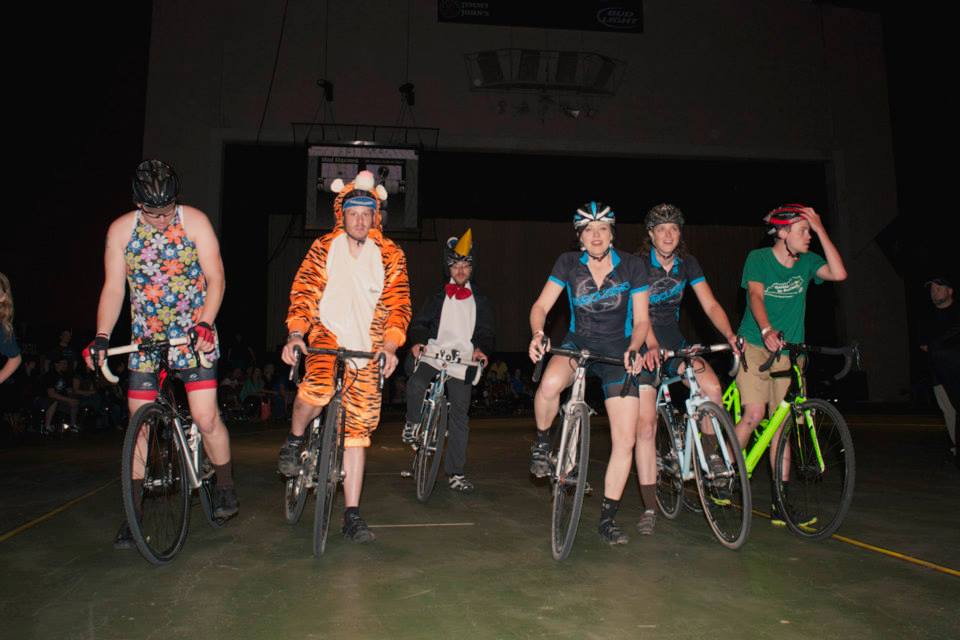About Star City CX
Our number one goal is to make racing easy and fun for anybody who is interested. It can be scary getting into bike racing so we make sure to have plenty of free beginner-friendly clinics to show people how much fun cross is. Rain or shine we have people of all skill levels show up to practice and help each other learn. It's great to see such enthusiasm and dedication for the sport from all experience levels.
CX School
So, how do you make a cyclocross race accessible enough that someone with a bike and a bit of curiosity gives it a try?

We started with a plan for practice sessions, calling them CX School. Starting in late August, we had at least one session a week at parks in the central part of the city. At our first practice, we had several people who had never ridden a bike off-pavement, and one who was brand-new to clipless pedals. We had a few children attending with their parents. We focused on the basics, trying very hard to remember to remove jargon until we’d introduced what it meant. How do you move your body weight to steer your bike? How do you evaluate a turn? How do you accelerate out of a corner? How do you get on and off your bike?
We made a little handout on cyclocross with links to videos and online resources and a local/regional race schedule. Each and every practice was open to total beginners, and we made sure to go over those introductory pieces each time, as we had new people joining throughout the season. Beginners attending several practices were able to help new riders, reinforcing their own developing skills in the process. These CX School sessions were all free, and even if you attended just once, we wanted to ensure you could enter a race with confidence that you could finish and have fun.
From the very first race, the crowd rivaled those at many local weekend races.
Cheap
To keep entry fees low, we made a bargain: there would be no prize purse. Why? Veteran racers know that nothing is better training than racing, and for those carrying an annual license, pre-registering for the race cost them just $7. For beginners without an annual license, the cost was slightly higher at $17, but still a far cry from the cost of entry to an average race. Folks who didn’t pre-register could still sign up day-of, with an added $10 charge. For junior racers, the cost of entry was always an even $7. Better yet, because of our emphasis on low entry fees, we had new racers giving it a try for the first time each week as the series progressed.
Fun
We really pushed to get spectators out to the races, and moving to new neighborhoods across town was great for this. Thanks to some press coverage in the Lincoln Journal-Star, we moved beyond the reach of our social networks, too. From the very first race, the crowd rivaled those at many local weekend races, with cowbells and funny signs and bacon hand-ups and people in costume. We loved seeing folks from neighboring streets walking over to see what was going on and joining in the fun.
Despite our commitment to a grassroots feel for the event, we strove to make the courses as well-marked and thought out as possible – we were aiming for D.I.Y. done right. Course designer Craig Schmidt was supported by the tireless help of the crew from Cycle Works and race official Scott Bulfinch in staking, taping, chalking, flagging, and preparing the courses for an excellent race experience. Because having an announcer and music adds to the fun and excitement of the race experience, we were thrilled that Christopher Van Ooyen was able to lend his skills on the microphone. After the races, we were humbled by the help from spectators in tearing down the course markings. It was evidence of another goal of ours: building community.
Like many things, cycling can develop a culture of elitism. There are fancy bikes, special racing attire that teams have that all matches, and lots of insider knowledge that develops over years of experience. It can be really intimidating to someone new to the community – whether just to the city of Lincoln or to bike racing in general. While we certainly wanted to see established teams and racers come out and enjoy a high-quality mid-week practice race, we also wanted to develop a culture where beginners could feel like they belonged, too. Where you could race in costume if you wanted to. Where you’d be encouraged to push yourself and have fun. Where you were encouraged to introduce yourself and make friends at the start line. For the women especially, Elisabeth made sure that they were offered a Sheclismo jersey to borrow, if they wanted to. It means a lot to feel like you belong. And as the season progressed, friendships and friendly rivalries developed. And we watched with great pride as many of our beginners changed their social media profile pictures to images of themselves racing. And if they didn’t have a look of concentration on their faces, they were smiling broadly.

